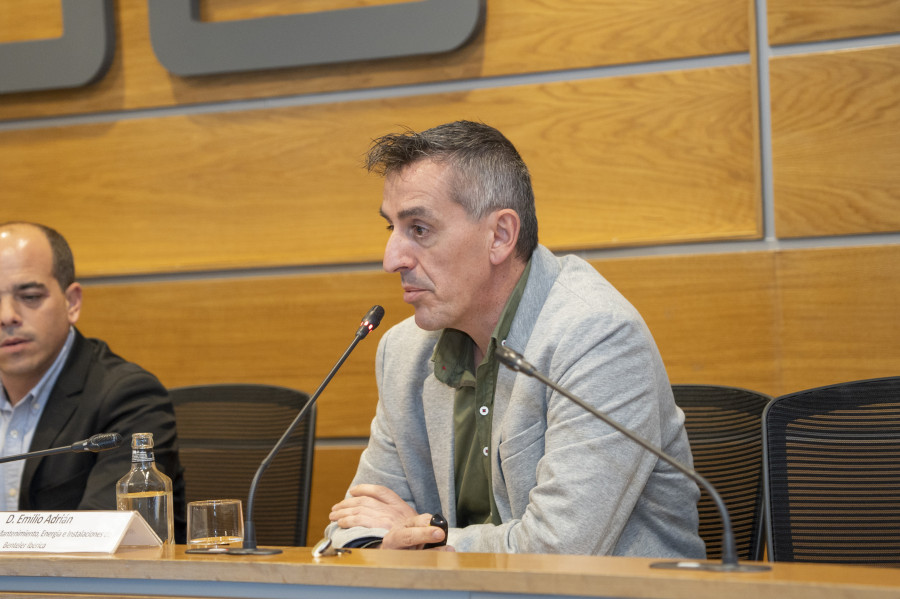Digitization and automation in maintenance

Emilio Adrián, Maintenance, Energy and Facility Manager at Benteler Ibérica Holding, structured his presentation explaining his vision of the automotive industry market and how it affects the job market in terms of the qualification of technicians and operators. Also the impact of automation from the stress of maintenance teams and the supply of components. And finally, digitisation as a support tool for maintenance teams.
The head of Benteler went back to a pre-Covid situation when there was a scenario of “solid hierarchies, stability in orders and somewhat rigid structures. The challenges were summed up in an adequate maintenance of production and undertaking new projects in a sustained manner. Covid taught us to work in a different way, with sudden stops and discovering how inflexible we were and it posed a challenge to our adaptability. Today we face a different world from the one we had before, with a strong need to adapt production to demand and with high instability in the supply chain.
"Regarding the job market, the world of the automotive industry has lost its attractiveness and we are facing a generational replacement difficulty in the face of a type of employment at the polls, with high-pressure work environments, job instability and difficulty in compatibility with teleworking. However, companies will need more than 200,000 engineers in the next ten years in Spain. In maintenance, highly qualified technicians are needed to deal with three obsolescence vectors in terms of new facilities, new technologies and "new external requirements", since we are suppliers of other areas of the company such as logistics and security".
“The old profile of a maintenance technician required knowledge in PLC, robotics, pneumatics, hydraulics, electricity, mechanics and a lot of flexibility in time availability. Now, to that base are added skills in project management, energy management, digitisation, computing, data analysis, cybersecurity, etc. All this represents a challenge for maintenance departments”.
“The impact of automation is reflected in a smaller number of operators for more complex processes, but there is less knowledge of the machine by the operator. The machines incorporate a greater number of automatic elements that increase the stability of the process, but the stops for revision are lengthened. The rate of automation increases, but the processes lose robustness. In maintenance, the technological delta is increasingly aggressive and the impact of automation on the team is often not considered. The reduction of operators in production can lead to an increase in the maintenance area. Added to these known factors are the difficulty of supplying automation components and spare parts, with the consequence that continuous processes become discontinuous. On the other hand, from the Industry 4.0 concept, digital twins and process simulation come into play, which implies multivariable predictive maintenance”.
“Digitization understood at the office level helps us a lot. We are currently immersed in a large process of changing and updating our maintenance management software, which allows our systems to intercommunicate with the management of financial and operating costs. We have better historical information for decision making in failure situations. Digitisation, in terms of simulating processes and even plants, makes updating processes easier to implement and increases the guarantee of success, which is also a very positive factor. We have a high level of digitisation of the entire plant in all factories. Not all factories at the same level, but with good data capture, which we are learning to read more efficiently and make decisions based on that data. We are taking the first steps in the use of Big Data”.
Emilio Adrián concluded his presentation by detailing real examples of application of maintenance in the analytic cells based on the monitoring of the circulation currents; in the maintenance of welding equipment based on the monitoring of wire drag currents/forces; and in the prevention of breakdowns by monitoring key parameters in stamping processes.
Presentation published in AutoRevista 2.375 issue
Lea esta presentación en castellano
Watch the full conference on the AutoRevista YouTube channel

A requerimiento de AutoRevista sobre la imposición de aranceles del 30% a vehículos y componentes de la Unión Europea por parte de la Administración Trump, desde CLEPA señalan que "instamos encarecidamente a la UE a que impulse una exención para las piezas de automóviles en cualquier acuerdo.

La Asociación Española de Renting de Vehículos acaba de presentar su informe anual, y con él cifras más que optimistas para el segmento. Tanto es así que el parque de vehículos en renting ha crecido el 6,11% durante el primer semestre de este 2025 (una cifra levemente superior a la prevista por la asociación, el 6%), lo que implica que este asciende a 984.354 unidades totales.

Nissan ha construido un nuevo centro de reacondicionamiento de vehículos en la Planta de Nissan Ávila, diseñado para ofrecer a los clientes la experiencia de reestrenar un coche, gracias a un proceso altamente especializado y con los estándares de calidad Nissan.

PowerCo Battery Spain (PowerCo) y el ITE (Centro Tecnológico de la Energía) han establecido un acuerdo de colaboración con el objetivo de incrementar las capacidades formativas sobre esta industria pionera en España.

La filial española de Dacia ha designado a un nuevo Comité de Dirección con el propósito de continuar creciendo en 2025, después de lograr los mejores resultados de su historia en el primer semestre del año con un 9,6% de la cuota del mercado a particulares.
